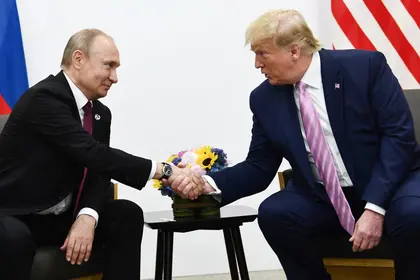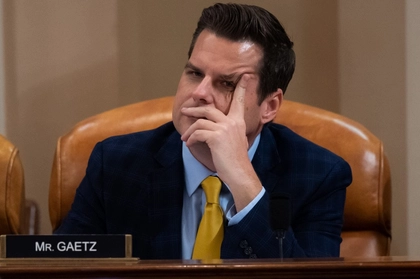On May 19, the Russian Foreign Ministry declared 500 US citizens persona non grata, that is, they will no longer be allowed visas to enter the Russian Federation. Last summer, Russia declared 1,000 Americans undesirable, and it has added some in between. The composition of these lists tells us quite a bit about Russia’s policy on the US. Russia does not want people who know anything about Russia or have political influence unless they are fully pro-Putin.
Last year, the pattern was very clear: Russia sanctioned all relevant senior people in the Democratic US administration, almost all congressmen of both parties, apart from those truly pro-Putin, such as Republican Senators Rand Paul and Josh Hawley; also prominent representatives of US armaments companies, ardent pro-Ukrainian public figures and some think tank analysts, primarily from the Atlantic Council.
I was honored to be declared persona non grata, presumably as a member of the last two categories. Curiously, three people who had already passed away, notably John McCain, were sanctioned, as if the Russians were afraid of their ghosts.
Former President Donald Trump and anybody who was close to him were excluded – apart from those vocally critical of Putin, such as Republican Senator Ted Cruz or former National Security Advisor John Bolton.
This year’s list looks more professional, as if the Russian Ministry for Foreign Affairs has had more time to prepare itself better. The patterns are as clear as last year. It adds relevant new people in the administration and new members of Congress, both Republicans and Democrats.

Russia Gave N. Korea Oil, Anti-Air Missiles in Exchange for Troops: Officials
This time Russia has sanctioned many more think tank people. Much of the Atlantic Council was already sanctioned, but 32 more were added. The four new big enemies of Russia are the Rand Corporation (84 sanctioned! but not Samuel Charap), the Carnegie Endowment for International Peace (55, including Andrew Weiss and Eugene Rumer), the Brookings Institution (29, including Fiona Hill and Angela Stent), and the Center for Naval Analysis (Is the Kremlin dissatisfied with Michael Kofman’s prolific and astute analysis of the war in Ukraine?).
In addition, many odd intellectuals who are not at all very critical of Russia are sanctioned, such as the outstanding energy experts Daniel Yergin and Edward Chow, and Matthew Rojansky, CEO of the US Russia Foundation. Anyone dealing with Ukraine, such as Natalie Jaresko, are on the list. After this, everybody who deals with Ukraine or Russia at a think tank looks rather suspect, unless Russia has sanctioned them. Surprisingly, few university professors have been included. Does the Kremlin think that it has successfully muffled them? What do those intellectuals not sanctioned have to say in their defense?
Last year, most former US ambassadors to Ukraine were sanctioned. This year amounts to a clean-up operation, with the sanctioning of former US ambassadors to Ukraine Geoffrey Pyatt, Marie Yovanovitch, and John Tefft as well. Former ambassadors to Russia Alexander Vershbow and Michael McFaul were sanctioned last year. William Burns was sanctioned as head of the CIA. Now the Russians hit Tefft and Jon Huntsman. The Russians have refrained from sanctioning five living former US ambassadors to Russia: James Matlock, Thomas Pickering, James Collins, John Beyrle, and John Sullivan. Do they really think that they can accomplish something by pitting five against five?
The armaments companies appear to have faded in prominence. General Dynamics stood out this time, but it had only ten employees sanctioned.
The Russians have already demonstrated their loyalty to Donald Trump by not touching people close to him, but this year they went even further. They are actively trying to punish Americans, whom they identify as Trump’s adversaries. They include Letitia James, the state attorney general of New York, who has investigated and sued him; Brad Raffensperger, the Republican secretary of state of Georgia, who rebuffed Trump’s pressure to reverse the outcome of the 2020 election; and Lt. Michael Byrd, the Capitol Police officer, who shot pro-Trump rioter Ashli Babbitt on Jan. 6, 2021. To my knowledge, none of these people have said a word about Russia. Less strikingly, the sanction list contains many state prosecutors and similar officials, who may have acted against Trump. The Kremlin is openly and blatantly campaigning for Trump.
Even more telling is the Russian sanctioning of five television entertainers. They are all critical of Trump and of course democratically oriented: namely, Stephen Colbert, Jimmy Kimmel, Rachel Maddow, Seth Meyers and Brian Williams. Needless to say, nobody from Fox News or the extreme right is being sanctioned.
Russia’s Foreign Ministry has now told us all we need to know. It dislikes all people who know anything about Russia, if they are not fully committed to Putin. Moreover, it has no qualms about engaging openly in US domestic politics.
Anders Åslund is the author of “Russia’s Crony Capitalism: The Path from Market Economy to Kleptocracy.”
The views expressed in this opinion article are the author’s and not necessarily those of Kyiv Post.
You can also highlight the text and press Ctrl + Enter






